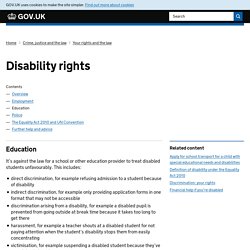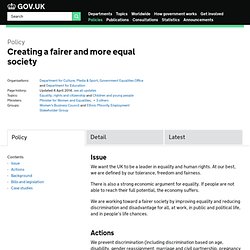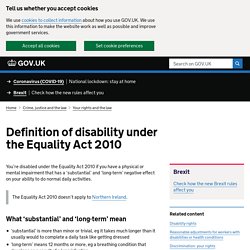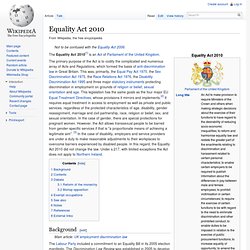

Learning and your rights : Directgov - Disabled people. It’s against the law for a school or other education provider to treat disabled students unfavourably.

This includes: direct discrimination, for example refusing admission to a student because of disability indirect discrimination, for example only providing application forms in one format that may not be accessible discrimination arising from a disability, for example a disabled pupil is prevented from going outside at break time because it takes too long to get there harassment, for example a teacher shouts at a disabled student for not paying attention when the student’s disability stops them from easily concentrating victimisation, for example suspending a disabled student because they’ve complained about harassment Reasonable adjustments An education provider has a duty to make ‘reasonable adjustments’ to make sure disabled students are not discriminated against.
These changes could include providing extra support and aids (like specialist teachers or equipment). Higher education. Equalities. Issue We want the UK to be a leader in equality and human rights.

At our best, we are defined by our tolerance, freedom and fairness. There is also a strong economic argument for equality. If people are not able to reach their full potential, the economy suffers. We are working toward a fairer society by improving equality and reducing discrimination and disadvantage for all, at work, in public and political life, and in people’s life chances.
Actions We prevent discrimination (including discrimination based on age, disability, gender reassignment, marriage and civil partnership, pregnancy and maternity, race, religion or belief, sex, sexual orientation) by: We support and protect the rights of women by: We protect the rights of children by: making sure UK government policies take account of the United Nations Convention on the Rights of the Child (UNCRC) We support the rights of British citizens abroad and use our influence to support international equality.
Background Bills and legislation. Disability and the Equality Act 2010 : Directgov - Disabled people. You’re disabled under the Equality Act 2010 if you have a physical or mental impairment that has a ‘substantial’ and ‘long-term’ negative effect on your ability to do normal daily activities.

What ‘substantial’ and ‘long-term’ mean ‘substantial’ is more than minor or trivial, eg it takes much longer than it usually would to complete a daily task like getting dressed ‘long-term’ means 12 months or more, eg a breathing condition that develops as a result of a lung infection There are special rules about recurring or fluctuating conditions, eg arthritis. Progressive conditions A progressive condition is one that gets worse over time. However, you automatically meet the disability definition under the Equality Act 2010 from the day you’re diagnosed with HIV infection, cancer or multiple sclerosis. What isn’t counted as a disability There’s guidance on conditions that aren’t covered by the disability definition, eg addiction to non–prescribed drugs or alcohol. Equality Act 2010. The Equality Act 2010[1] is an Act of Parliament of the United Kingdom.

Background[edit] The Parliamentary process was completed following a debate, shortly after 11pm on 6 April 2010, when amendments by the House of Lords were accepted in full.[6] Contents[edit] Debate[edit] Reform of the monarchy[edit] In April 2008, Solicitor General Vera Baird announced that as part of the Single Equality Bill, legislation would be introduced to repeal parts of the Act of Settlement 1701 that prevent Roman Catholics or those who marry Roman Catholics from ascending to the throne, and to change the inheritance of the monarchy from cognatic primogeniture to absolute primogeniture, i.e. the first-born heir would inherit the throne regardless of his or her gender or religion.[16] Bishop opposition[edit] Exempt occupations[edit] Certain employment is exempted from the act, including: See also[edit] Notes[edit] References[edit] External links[edit]